News |
Forest bathing in Japan - the art of shinrin-yoku
Read our guide for the best places to experience the healing practice of shinrin-yoku, or forest bathing, in Japan.
By Walk into Luxury
The Japanese practice of shinrin-yoku, or forest bathing, is about immersing yourself in nature with all of your senses. Likely practiced for centuries, the concept shinrin-yoku was first introduced in the 1980s as a way to counter the stress of fast-paced urban living. Today, with technology and screens dominating both our work and social lives, the chance to truly switch off feels increasingly rare, and so, choosing to disconnect must be intentional. Shinrin-yoku provides that space - a conscious return to nature that has even been prescribed by Japanese doctors for its restorative health benefits.
Rather than hiking with a destination in mind, forest bathing is about slowing down and engaging fully with your surroundings – noticing the filtered light peeking through the canopy, breathing in the scent of cedar and damp earth, listening to birdsong and the crunch of twigs underfoot, feeling the texture of bark and moss beneath your fingertips, even tasting the freshness of the cool mountain air. By tuning into these sensory moments, the stillness of the forest begins to restore balance.
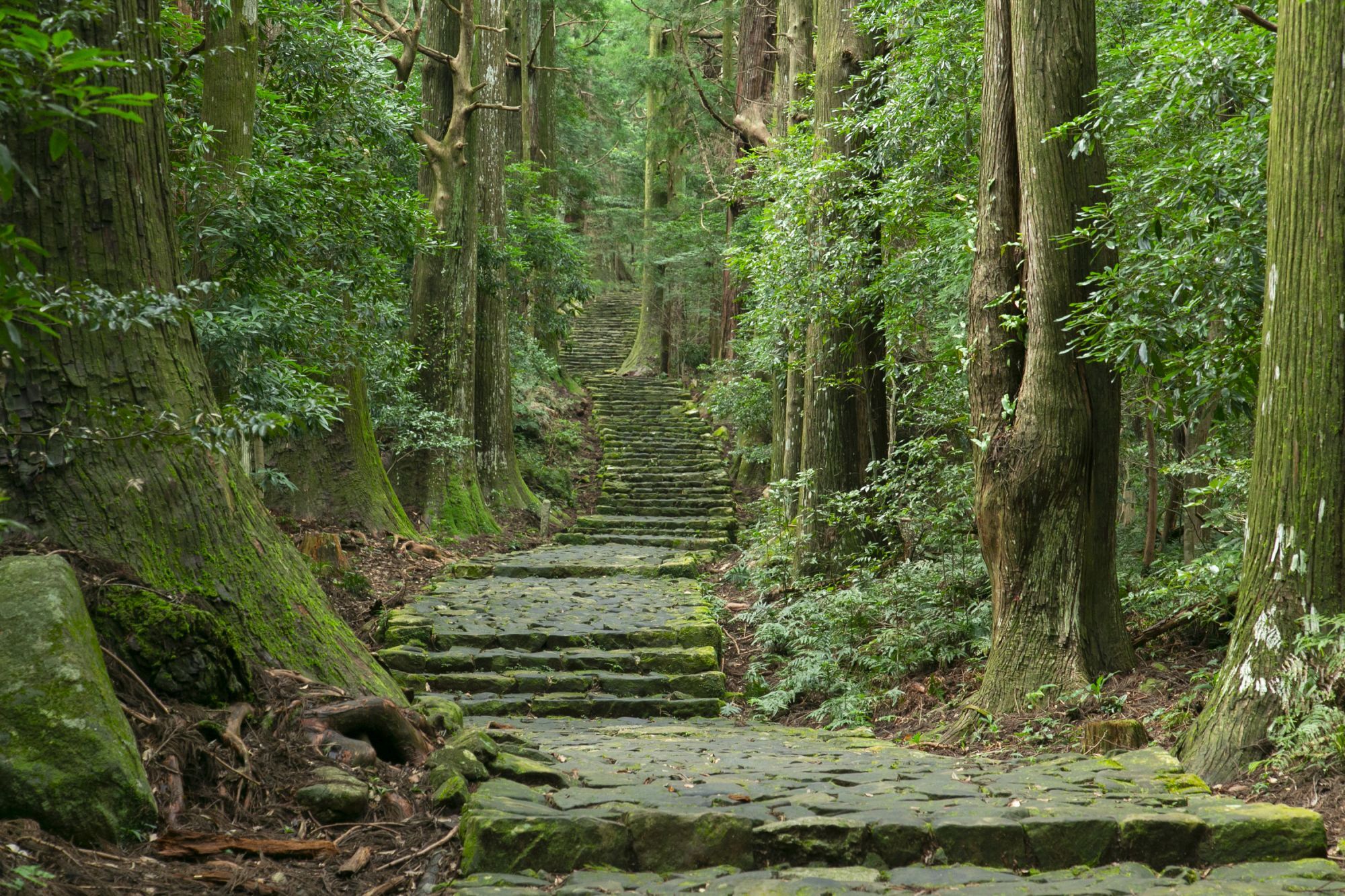
Image: Kumano Kodo trail
Read on for some of our favourite places to experience forest bathing in Japan, many of which feature in our journeys.
Nikko
Two hours north of Tokyo, Nikko is well known for its ornate temples and shrines, but step beyond the cultural landmarks and you’ll find yourself in a landscape of lakes and forested mountains. Trails weave through cedar and maple groves, circling Lake Chuzenji and leading to waterfalls hidden deep in the forest. This is a place where nature and spirituality have long been intertwined, and where forest bathing comes naturally.
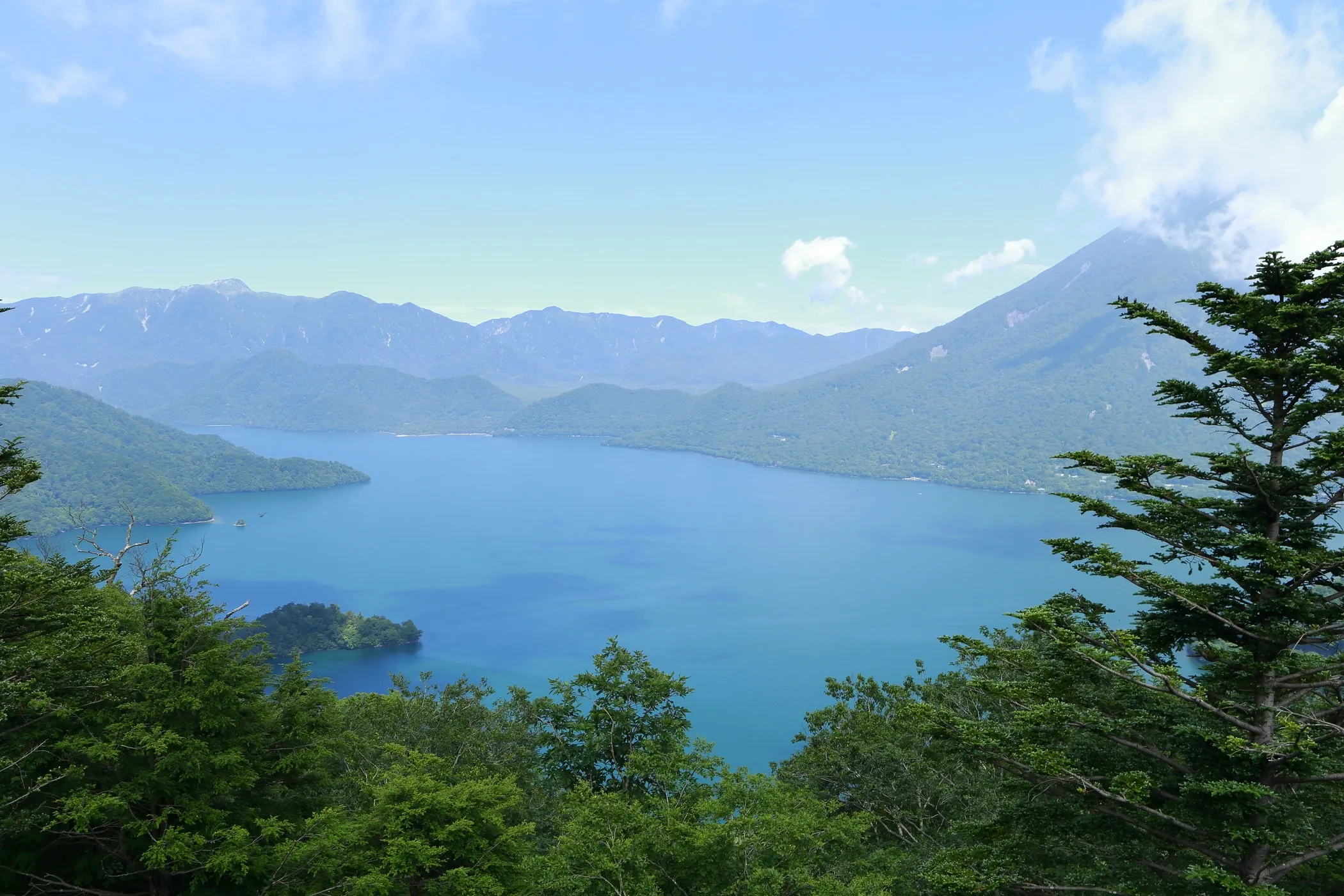
Image: Lake Chuzenji, Nikko
Our Pick
- The 4 Day Nikko Luxury Walk with Spacia X journey features a stay at The Ritz-Carlton Nikko, right on the shores of Lake Chuzenji – the perfect base for a forest stroll or a peaceful lakeside walk.
Koyasan
High in the mountains of Wakayama, the sacred town of Koyasan is surrounded by towering cedar forests that feel almost otherworldly. Walking quietly along the moss-lined paths of Okunoin Cemetery, past centuries-old tombs shaded by cedar giants, it’s easy to sense the spiritual energy of this place. Koyasan is considered the heart of Shingon Buddhism, and time spent here in the forests brings both peace and perspective.
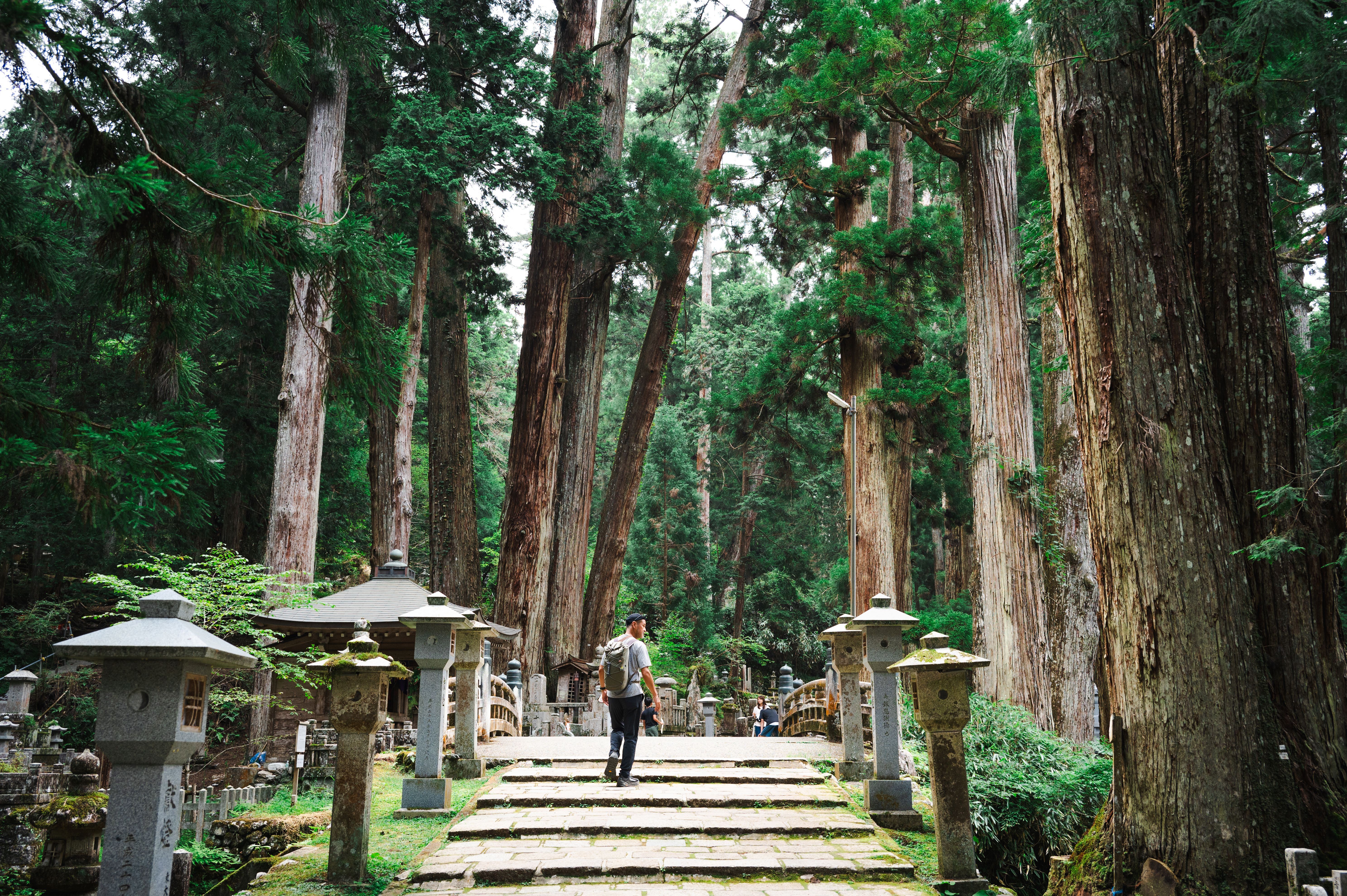
Image: Okunoin Cemetery, Mount Koya
Our Pick
- Visit Okunoin Cemetery and spend time in Koyasan on the 9 Day Kumano Kodo & Kii Mountains Pilgrim Trails and 13 Day Best of the Kumano Kodo & Nakasendo Trail journeys, soaking up the unique atmosphere of this spiritual centre.
The Kii Mountains and Kumano Kodo
From the ridgelines above Koyasan, you can look out across the vast Kii Mountain range, where dense forests stretch as far as the eye can see. The Kumano Kodo pilgrimage routes cut through these valleys, linking ancient shrines such as Hongu Taisha and the iconic Nachi Falls. Along the way you’ll encounter remote villages, steaming onsens, and untouched tracts of cedar and cypress forest. Walking here is more than a journey through nature – it’s a spiritual rite that connects you to centuries of pilgrims who sought renewal on these trails.
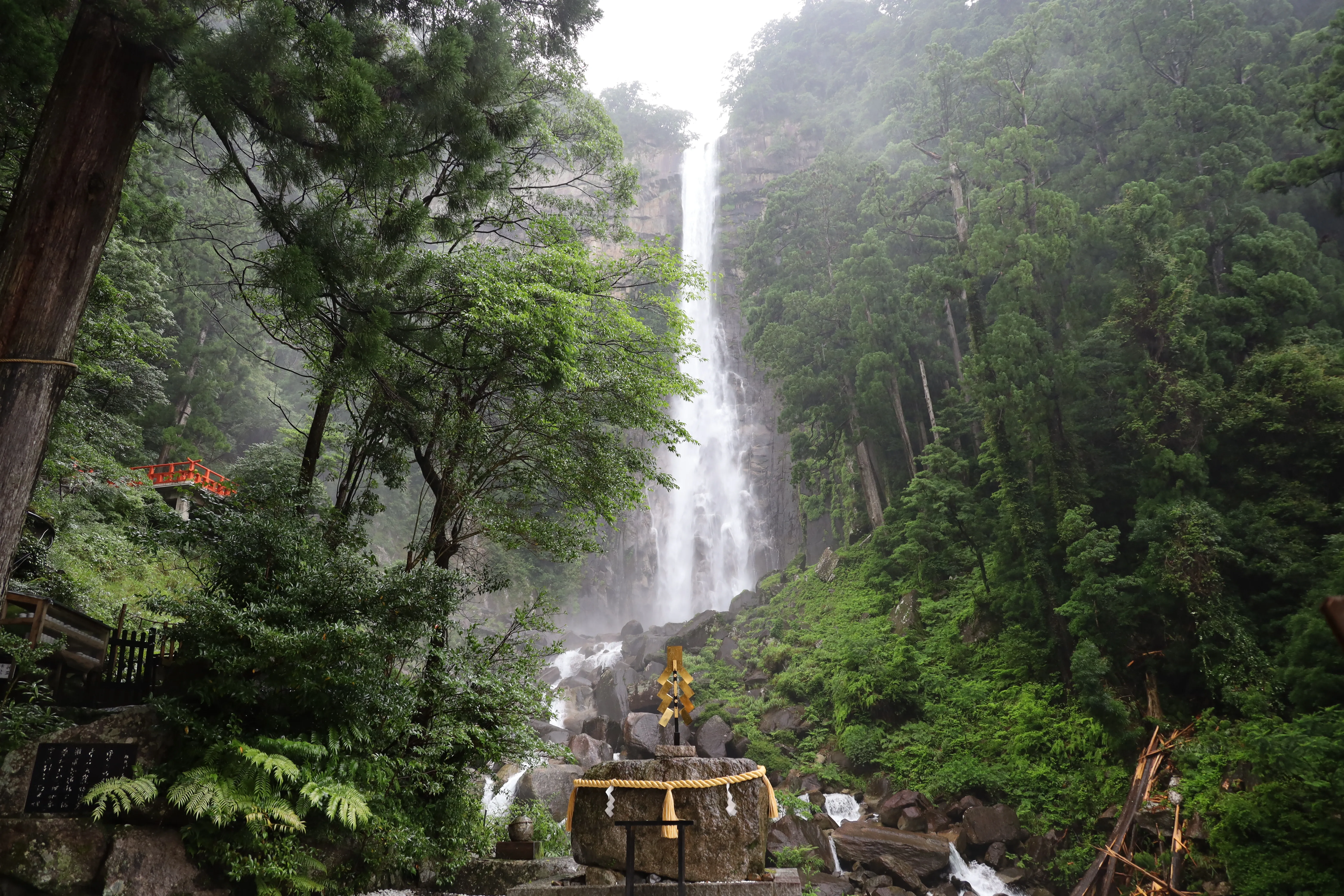
Image: Nachi Falls
Our Pick
- On the 9 Day Kumano Kodo & Kii Mountains Pilgrim Trails and 13 Day Best of the Kumano Kodo & Nakasendo Trail journeys, you’ll spend days trekking some of the best sections of the ancient Kumano Kodo with a private local guide.
Kiso Valley and the Nakasendo
The Kiso Valley is home to one of Japan’s most historic walking routes, the Nakasendo Trail. Once used by samurai and merchants travelling between Kyoto and Edo, the trail winds through shaded cedar forests, past clear mountain streams and preserved post towns that feel frozen in time. The famous Kiso cedar provides a natural canopy overhead, filtering the sunlight as you walk. This is forest bathing with a cultural edge – every step brings both natural beauty and deeper insight into Japan’s heritage.
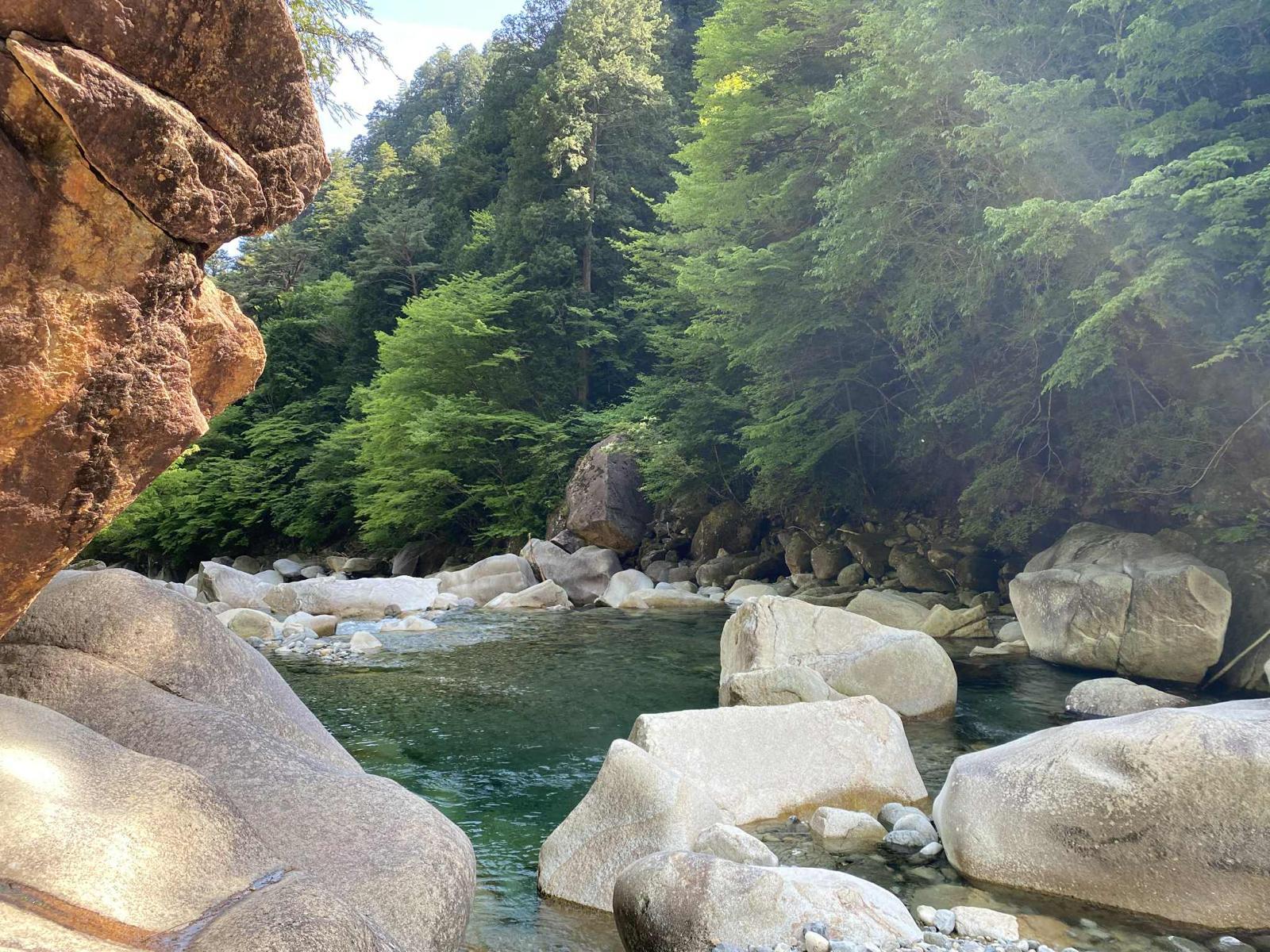
Image: Kiso Valley
Our Pick
- Follow the Nakasendo trail from Kiso Valley to the charming post towns of Magome, Tsumago and Narai over several days on the 7 Day Best of the Nakasendo Trail and Kiso Valley, 10 Day Best of the Nakasendo & Japanese Alps and 13 Day Best of the Kumano Kodo & Nakasendo Trail journeys.
Kamikochi
Nestled in the Japanese Alps, Kamikochi is famed for its alpine scenery. Surrounded by 3,000-metre peaks, the emerald forests and crystal-clear rivers create one of Japan’s most pristine settings for forest bathing. Breathing deeply in the cool alpine air, it’s easy to understand why this valley has inspired poets, painters, and countless nature lovers.
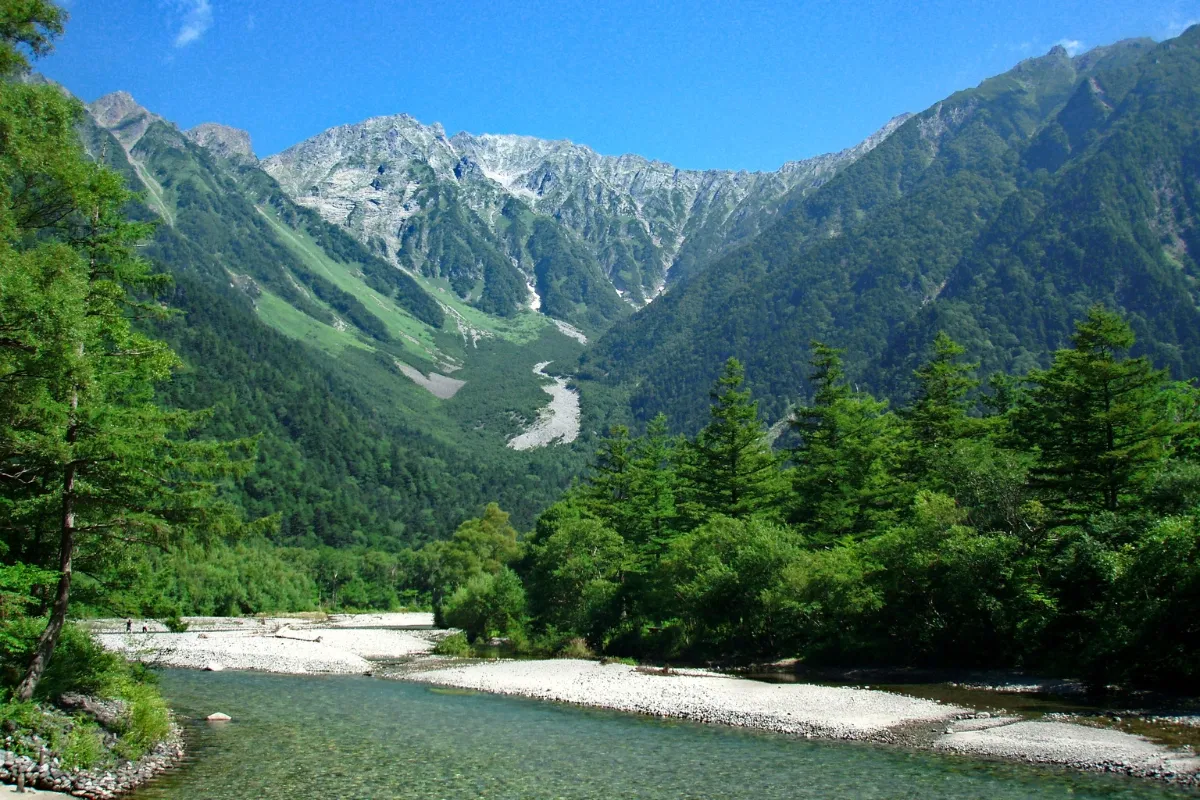
Image: Kamikochi
Our Pick
- There’s a reason the crowds flock here, but on the 4 Day Best of Japan's Alps and 10 Day Best of the Nakasendo & Japanese Alps journeys, we guide you to the quieter forested trails and more secluded areas around Kamikochi and Mount Hotaka.
Mount Fuji & Aokigahara Forest
At the base of Japan’s most iconic peak lies Aokigahara Forest, known as the Sea of Trees. This dense woodland, shaped by ancient lava flows, is filled with twisted trees, mossy stones, and caves hidden in the shadows. While it carries a certain mystery, it’s also a fascinating setting for forest bathing. Beyond Aokigahara, trails around the Fuji Five Lakes provide gentler forest walks with striking views of Mount Fuji rising above the treeline.
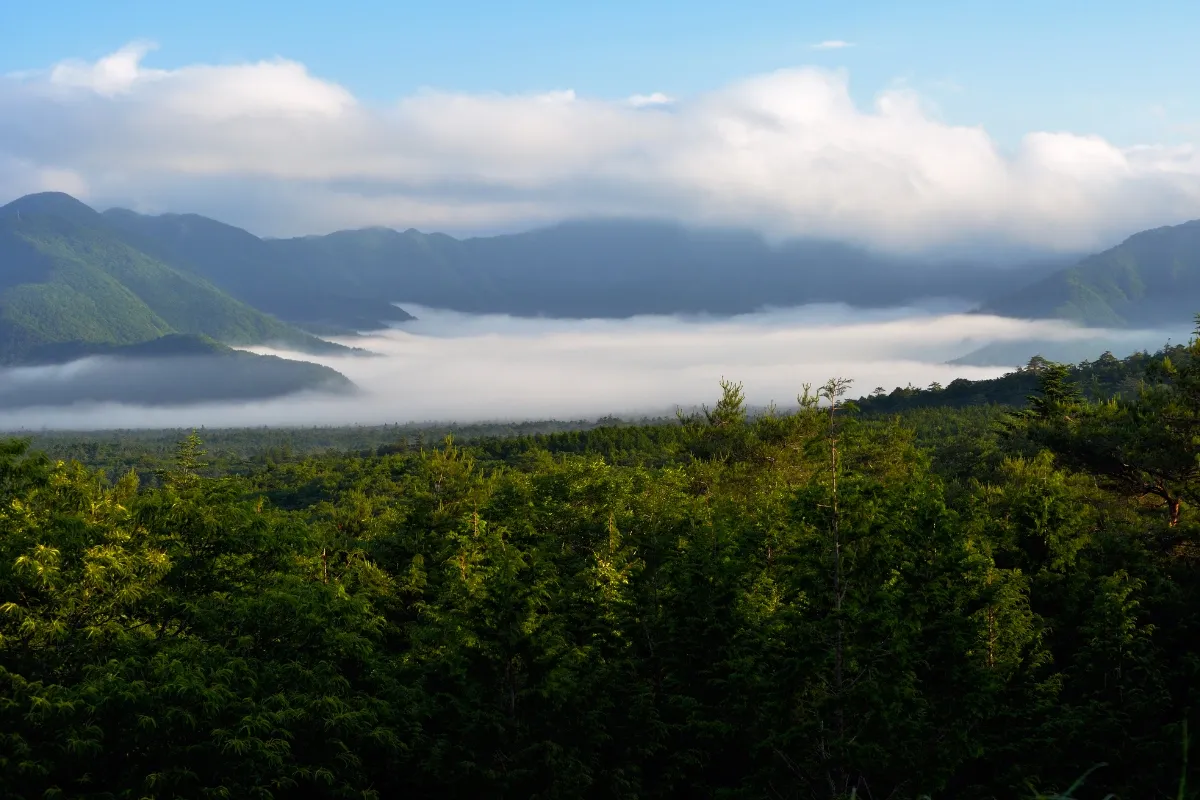
Image: Aokigahara Forest
Our Pick
- Stay at Fufu Kawaguchiko on Lake Kawaguchi, surrounded by forest and in the shadow of Mt Fuji – the perfect setting for forest bathing on the 4 Day Best of Japan's Alps and 10 Day Best of the Nakasendo & Japanese Alps journeys.
Kyoto
The city of Kyoto is framed by forested foothills, where cedar and maple groves shelter centuries-old temples. Many visitors make their way to the famous Arashiyama Bamboo Grove (and we certainly recommend a visit), but its popularity means it can feel more lively than calming. For a more authentic forest bathing experience, quieter places such as the Philosopher’s Path in Higashiyama or the moss-covered gardens of Gio-ji offer a tranquil setting to slow down and connect with nature.
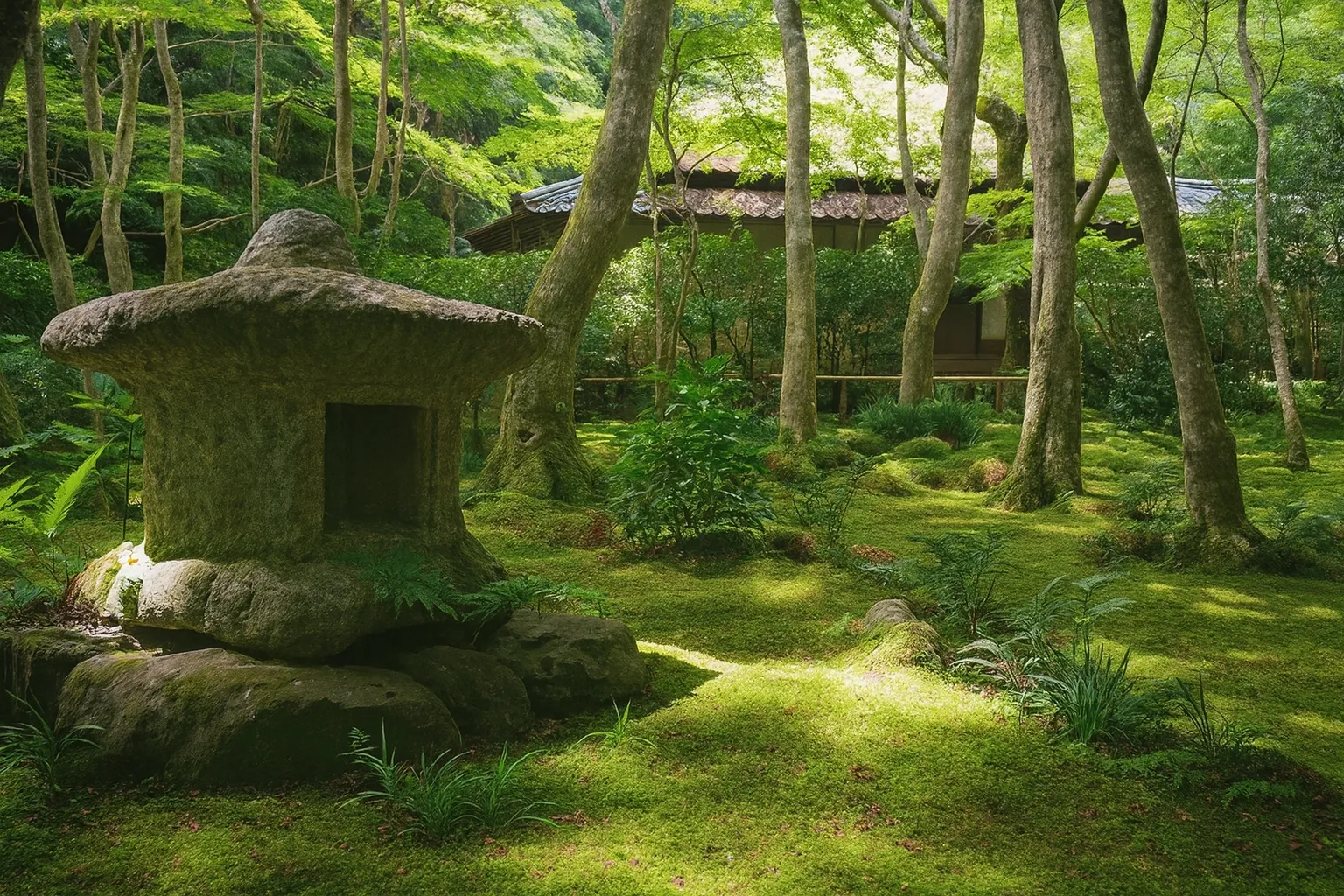
Image: Gio-ji Temple gardens, Kyoto
Our Pick
- Many journeys begin in Kyoto, allowing opportunity to explore the lush surrounds and ground yourself in nature before setting off on a bigger adventure – see 7 Day Best of the Nakasendo Trail and Kiso Valley, 9 Day Kumano Kodo & Kii Mountains Pilgrim Trails, 10 Day Best of the Nakasendo & Japanese Alps and 13 Day Best of the Kumano Kodo & Nakasendo Trail
Nakanoshima Island
Set just off the coast of the Kii Peninsula, Nakanoshima Island is covered in lush forest that slopes gently to the sea. Staying here offers a rare chance to combine forest bathing with the restorative energy of the ocean, with cedar and cypress groves leading to secluded bays and coastal viewpoints. The island’s quiet trails invite slow exploration, where the scent of pine mixes with fresh sea air.
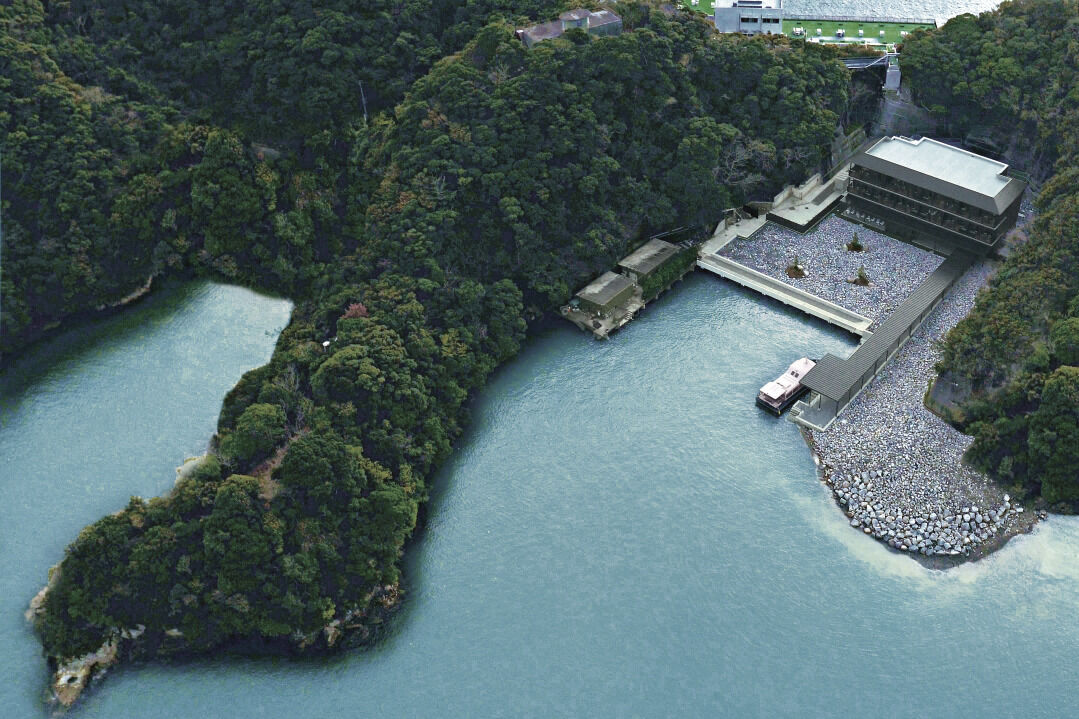
Image: Kumano-Bettai Nakanoshima, Kii-Katsuura Bay
Our Pick
- Enjoy an overnight stay at Kumano-Bettai Nakanoshima on the 9 Day Kumano Kodo & Kii Mountains Pilgrim Trails and 13 Day Best of the Kumano Kodo & Nakasendo Trail journeys, where you can step out straight into the surrounding wilderness.
Yakushima Island
Far to the south, Yakushima Island offers one of the most magical forest bathing experiences in Japan. The island’s ancient cedar forests are home to some of the world’s oldest trees, including the famed Jōmon Sugi, estimated to be over 7,000 years old. Moss blankets the forest floor and waterfalls cascade through deep ravines, creating an atmosphere straight out of a fairytale. Walking beneath these monumental trees is a humbling experience, a reminder of both nature’s endurance and its serenity.
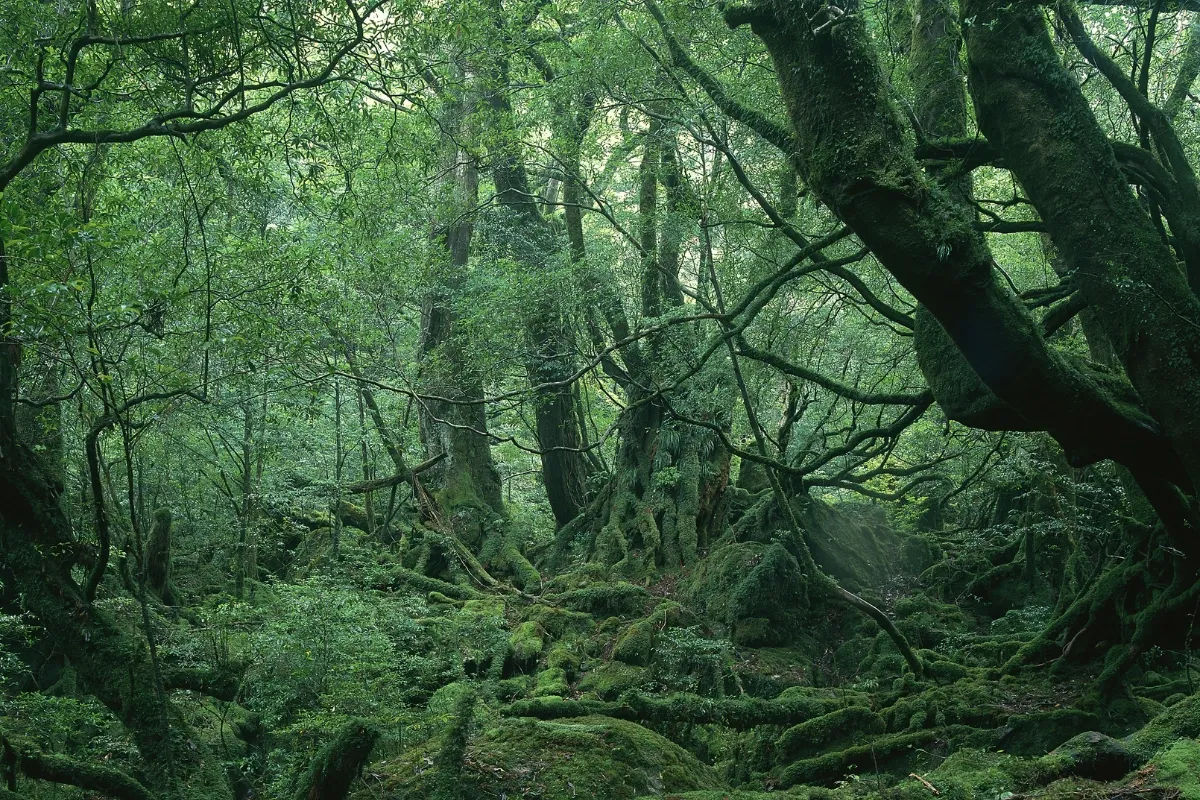
Image: Yakushima Island
Our Pick
- Stay tuned for a new signature journey here in the future.
Embracing the art of shinrin-yoku
Beyond the sense of calm it brings in the moment, forest bathing also carries proven health benefits. Japanese studies have shown that time spent in forests can lower stress hormones and blood pressure, while improving sleep, mood, and focus. By easing the impact of chronic stress, shinrin-yoku supports both physical and mental wellbeing – strengthening the immune system and helping the body find balance in an increasingly fast-paced world.
Whether you’re following the Nakasendo through the Kiso Valley, pausing in the cedar groves of Koyasan, or walking beneath Yakushima’s thousand-year-old trees, Japan’s forests offer a powerful reminder to slow down and simply be present. Shinrin-yoku is not about how far you go, but how deeply you connect with the forest.
Discover Japan
- 4 Day Nikko Luxury Walk with Spacia X
- 4 Day Best of Japan's Alps: Kamikochi, Mt Fuji & Mt Hotaka
- 7 Day Best of the Nakasendo Trail & Kiso Valley
- 9 Day Kumano Kodo & Kii Mountains Pilgrim Trails
- 10 Day Best of the Nakasendo & Japanese Alps
- 13 Day Best of the Kumano Kodo & Nakasendo Trail